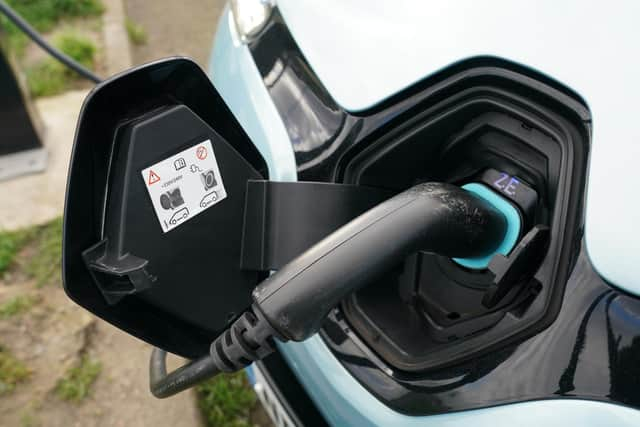Northampton comes out as one of the worst in country for electric car charging points...but there plans to install more in the future
and live on Freeview channel 276
Northampton is well behind the curve on the green transport revolution, new figures suggest, with among the worst access to electric car charging points.
There were just 17 public charging devices in the area at the start of April, according to new Department for Transport data.
Advertisement
Hide AdAdvertisement
Hide AdThat’s a rate of eight per 100,000 people, leaving Northampton trailing most council areas across the UK for accessibility. The area has added two new devices to its supply since the last count in October, when there were 15.


Across the UK, the number rose by 19% over the six-month period to just under 18,000 in April – a rate of 27 per 100,000.
However, as the Chronicle & Echo reported earlier this year, there are plans in place to install 22 new charging points at different locations across the town.
Northamptonshire County Council is working with Liberty Global, using the network infrastructure of their subsidiary firm Virgin Media, to install new points across the county at an unknown cost. Consultation was carried out earlier this year and the work was due to start in the summer but this was before lockdown and it is not known whether this has affected plans.
Advertisement
Hide AdAdvertisement
Hide AdSpeaking at the time, cabinet member for place, highways and the environment, Jason Smithers, said: “We hope that the installation of more electric vehicle charging points will not only help residents who own electric vehicles but also encourage greater take-up by the wider community."
Referring to the national figures from the Department of Transport, Edmund King, president of the AA, said: “One of the myths we urgently need to clear up is a perceived lack in charging points. However, if drivers feel they cannot find a charge point then more needs to be done.”
Better signage for the devices could make them easier for motorists to spot, he suggested, as well as finding solutions for those who want to charge their car at home but do not have off-street parking.
He added: “Encouraging drivers to make the switch to electric cars will also encourage both councils and businesses to install charging infrastructure.
Advertisement
Hide AdAdvertisement
Hide Ad“We believe that further incentives are required to ease the transition to lower-emission vehicles, such as cutting VAT on the sale of certain vehicles or targeted scrappage schemes.”
The Daily Telegraph recently reported that Boris Johnson is considering launching plans to give drivers up to £6,000 to exchange their petrol or diesel car for an electric model.
Of the devices in Northampton, two were “rapid” charging points, which can crank most electric car batteries up to 100% in under half an hour.
There were 3,100 of these across the UK at the start of April.
Advertisement
Hide AdAdvertisement
Hide AdThe DfT data is sourced from the electric vehicle charging platform Zap-Map, which say it covers 95% of publicly accessible devices.
Some units can only charge one car at a time, while others can deal with multiple vehicles simultaneously.
Across the East Midlands, there were 925 charging devices – at a rate of 19 per 100,000, this put it sixth out of England’s nine regions for accessability.
Steve Gooding, director of the RAC Foundation, said the issue for drivers was less about the number of chargers and more about whether they work and are easy to use.
Advertisement
Hide AdAdvertisement
Hide AdHe added: “It’s high time connecting to a charge point proved no more challenging than pulling onto a service station forecourt to fill up with petrol and pay with your credit card."
A DfT spokesman said: “Accessing charge points has never been easier and we want to make it easier still, with a further £10 million to install chargers.
“The Government is considering the long-term future of incentives for zero-emission vehicles alongside our consultation on bringing forward the end to the sale of new petrol and diesel cars and vans.”